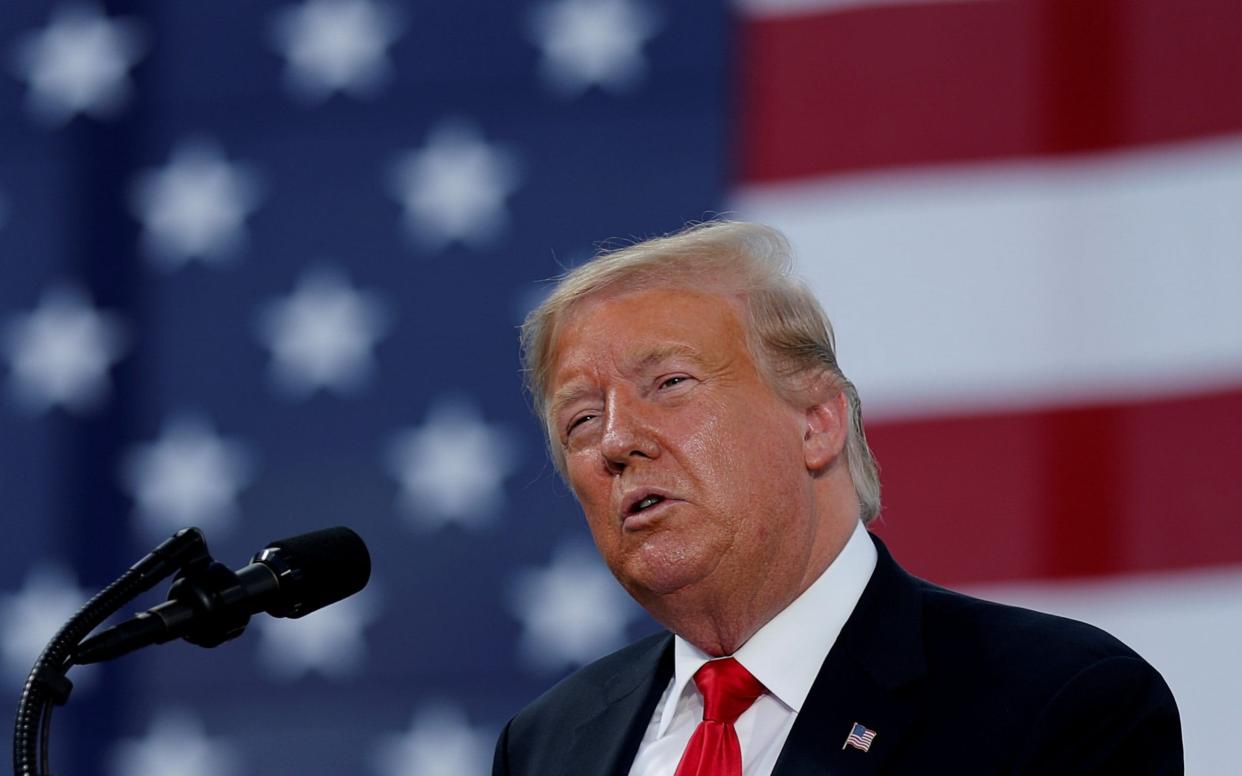Second wave of job losses threatens Trump's re-election bid

A month ago, Donald Trump’s election campaign was given a rare glimmer of hope by one of Wall Street’s biggest forecasting errors ever.
Analysts were stunned by the jobs report for May. Economists had predicted that US unemployment would continue to rocket from April’s 15pc, a high last hit during the Great Depression, but the jobless rate inexplicably fell to 13pc.
It suggested that the reopening of states was fostering a much faster than anticipated rebound in the labour market. While economists expect a further improvement in June’s unemployment rate to 12pc in new data released on Thursday, hopes of a sustained recovery are quickly vanishing.
The second wave of infections striking multiple US states is being accompanied by signs of another surge in job losses. And the economic pain is hitting Trump right where it hurts ahead of November’s vote – the battleground states that will swing the election.
“I’m happy to expect an increase in payrolls for June but I’m getting really nervous about what’s going to happen when we get into July and August,” says Ian Shepherdson, US economist at Pantheon Macro. “[Businesses] are letting people go again and letting go of people they fired and rehired across the South and the West.”
He says hopes of a rapid rebound in jobs this summer “look much less realistic after the second wave” in many parts of the US.
The American economy has been one of the hardest hit by job losses during the pandemic with unemployment surging from a 50-year low of 3.5pc to levels not seen for almost a century in a matter of months.
The Trump administration opted to boost unemployment benefits rather than introduce a furlough scheme that cushioned the blow in Europe by subsidising wages to keep workers in jobs. The economic pain has helped ensure the President is some nine points behind Democratic challenger Joe Biden in the polls.

Economists fear a second wave of Covid-19 infections risk delaying the US jobs recovery or even derailing it completely. Accelerating cases have forced many states to postpone or reverse their reopenings with the US recording its biggest one-day rise in infections on Tuesday.
“An ongoing rapid recovery of the labour market depends primarily on the further development of the pandemic and on the reactions of business and consumers,” warns Bernd Weidensteiner, Commerzbank economist.
The picture varies dramatically from state to state, with a quarter of workers in Nevada unemployed but just 5pc jobless in the more rural Nebraska.
The Covid-19 shock has hit jobs harder in “blue states” controlled by Democrats than in “red states", according to the Institute of International Finance. Robin Brooks, its chief economist, pinned this on the “greater urbanisation” and more services-orientated economies in typical Democratic states.
Hawaii and Las Vegas-reliant Nevada were dealt the biggest blows due to their disproportionately large tourism industries, he says.
The six key 2020 election battlegrounds were not especially hard hit by the first wave of job losses, except Michigan, but many look vulnerable if a second sweeps the country. A CNBC poll already puts Trump behind Biden in all six states – with the Democrat seeking political capital from Trump's haphazard virus response.
Arizona is putting many restrictions back in place, closing bars, gyms and cinemas after becoming one of the country’s biggest Covid-19 hotbeds. Its jobless rate was at 9pc in May but unemployment benefit claims surged in June, early data suggest.
Other swing states are also moving towards tighter restrictions, piling the pressure on jobs. North Carolina, Michigan and parts of Pennsylvania are delaying the next phase of reopening, and bars in Florida cannot serve alcohol in a bid to keep drinkers away in a bid to curb infection rates.
If laid-off workers vent their anger at the ballot box, Michigan and Florida look most vulnerable for Trump with unemployment rates in those states already at 21pc and 15pc respectively.
“If renewed containment measures across numerous states make it unviable for businesses to operate then it will only add to the problems in the jobs market,” warns James Knightley, ING economist.
He warns that unemployment benefits claims data are “remaining sticky” while data from Homebase - one of the few leading indicators that picked up the unexpected May number - suggest small businesses are “shedding jobs again”.
Recent history suggests Trump’s prospects for re-election are grim if the American worker is feeling the pinch.
The last two incumbent presidents to be beaten in an election – George HW Bush in 1992 and Jimmy Carter in 1980 - both saw the jobless rate rise in the 12 months before their defeats. Meanwhile, Barack Obama, George W Bush, Bill Clinton and Ronald Reagan all won second terms with the jobless rate on the decline.

“In normal times, the economy and in particular what’s happening to unemployment has a huge bearing on the outcomes of elections, particularly in terms of incumbent presidents,” says Andrew Hunter, Capital Economics US economist.
“We have seen an unprecedented rise in unemployment so that looks very poorly for Trump’s re-election chances.”
While Hunter expects a steady rebound in the labour market to continue, he warns it will take “many years” for unemployment to get back to the ultra-low levels seen before the virus.
A strong US economy was credited with propping up Trump’s approval rating before Covid-19. The president’s greatest strength is becoming his biggest problem - and time is running out.

 Yahoo News
Yahoo News 
